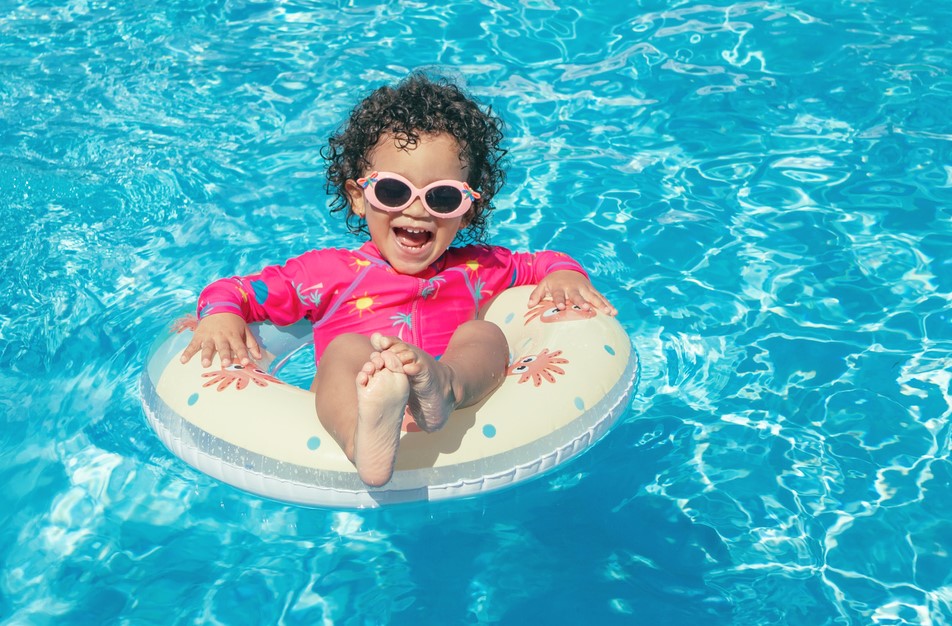
Introducing children to water activities at an early age can help them to develop a lifelong love of the water. Developing their skills and confidence in the water also greatly expands the number of activities the whole family can participate in, and as a very large bonus, it opens up the vacation opportunities that your family can safely have.
When your child knows how to swim, family vacations can be family fun times in the water. Playing in the ocean and exploring the beach can be good times for family members to slow down and appreciate being together. It also offers many learning opportunities as children hunt for seashells or watch marine life while snorkeling.
If you're hesitant to introduce your child to the water at a very young age, be aware that the American Academy of Pediatric now recommends that children begin to start swimming as young as one year of age! And there are very safe and accredited places to begin your child on specialized water-baby swimming lessons.
Benefit of Swim Classes and Early Water Sports
Swimming is well known as a great exercise activity for the entire body. It is low stress on joints. It also builds emotional maturity and confidence as students master new abilities. Some water sports, such as synchronized swimming and water polo, develop team building skills. Even early swim classes will help your child develop coordination.
Outdoor water activities can also become educational experience. Children are naturally curious about their world. Using a canoe or kayak outing can allow you to share information about marine life or the plants and birds found along a river. These skills and knowledge are things that will be with your children throughout their lives.
Type of Water Activities for Families and Children
A myriad water activities exist that the whole family can participate in. While young children may not be able to handle standup paddle boarding on their own, they can very well ride along with you - all made easier if the water is their friend and not a fearful place. Canoeing, sailing and kayaking are other activities to enjoy together. Once they get used to the working with the paddles, kids are well able to propel and steer themselves.
To keep everyone safe, let kids paddle in shallow water while you are standing close by - and you should already have learned the skills of water watching from the swim school. Life jackets add another layer of safety. Many children enjoy dock jumping at a lake. They will happily spend hours jumping in the water, climbing out and doing it all over again.
As your child grows, they will be able to engage in more water-based activities such as surfing, wakeboarding and white water rafting. Giving them the skills to be safe and thrive in the water lets them be able to try out a wide variety of water sports.
Expanded Opportunities for Family Adventures
When children learn to swim and develop water safety skills, a world of opportunities opens up for them. The whole family can enjoy one of the over 1,000 water parks in the US, many of them indoor and heated for year-round weekend getaways. These parks provide the chance for the whole family to play and cool off, or warm up, together. Beyond visiting the local pool or water park, vacation planning also changes. Now, the family can spend time at the beach or a lake. The types of available opportunities also increase as your child’s skills and confidence increase.
For instance, now you can consider that vacation to Key West for snorkeling opportunities. You may want to explore the sugary sands of the lake in Grand Haven, MI where you can all boat around Lake Michigan. Out west, the family can take a rafting trip through the Grand Canyon - this is considered the best way to see the Grand Canyon and its flora and fauna. If you are looking to expand your child’s cultural experiences, consider a trip to Ambergris Caye in Belize. There, kids can paddle-board, kayak and snorkel while exploring the second largest reef system in the world.
Developing Your Child’s Water Skills
In the early classes, students learn to move their body in the water and to control their breathing, moving on to rollovers and jumping in and climbing out of water. They learn safety as second nature, and treat the water as something to move around in. Before you know it, they will be ready to safely explore lakes, rivers and the beach. When you’ve prepared them, they will know how to avoid dangerous situations (kids are often drawn to landscaping water features or stormwater ponds as swimming holes, but these are hazardous places).
Older skilled swimmers also have the opportunity to explore different water sports. While boating may not appeal to them, surfing might. This opportunity to explore, learn and challenge themselves will create a lifelong love of water and water sports.
Heading Out in the World of Water
If fish-spotting is a goal, be sure to engage a knowledgeable tour master so that children can identify the creatures they see. Imagine snorkeling with your child and seeing colorful fish, coral formations and sea turtles. When your children develop their swimming abilities and strength, these types of excursions and many more are possible.
Introducing your children to water activities early provides them with a wide variety of opportunities for healthy exercise. Broadening the possibilities for family vacations can create more opportunities for family fun times that everyone will always remember. You’ll also appreciate that at the end of the day, their energy will be spent, and bedtime will be easier. Their sleep patterns will also be more consistent. Opening up the world for your child through opportunities for travel and water sports is a worthy investment with many returns.



























